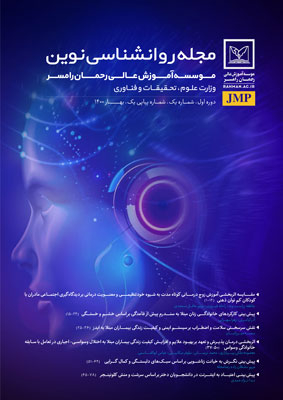Abbasi, H., Karimi, B., Jafari, D. (2017). The Effectiveness of Acceptance and Commitment Therapy on Frustration Tolerance and Dysfunctional Attitudes of Mothers of Students with Intellectual Disabilities.
Psychology of Exceptional Individuals, 6(24), 81-108.
[DOI: 10.22054/jpe.2017.20384.1522]
Aberson, C. (2007). Contact
, Perspective Taking, and Anxiety as Predictors of Stereotype Endorsement, Explicit Attitudes, and Implicit Attitudes.
Journal of group processes Intergroup Relations, 10(2):179-201.
[DOI: 10.1177/1368430207074726]
American Psychiatric Association (2013). Diagnostic and statistical manual of mental disorders (5th Ed). Washington, DC: Author. https://dsm.psychiatryonline.org/doi/book/10.1176/appi.books.9780890425596
Bhatia, M., Bhatia, S., Gautam, P., Saha, R., & Kaur, J. (2015). Burden assessment, Psychiatric morbidity and their correlates in caregivers of patients with intellectuall disabled.
East Asian Archives of Psychiatry, 25(4), 159-163.
https://easap.asia/index.php/find-issues/past-issue/item/283-1504-v25n4-p159
Falah, M. H., Mangali, A., & Zare, F. (2012). Investigating the effect of teaching Islamic coping style on increasing the happiness of parents of exceptional children. Yazd School of Health Quarterly (TolooeBehdasht), 11(2),75-82. https://tbj.ssu.ac.ir/article-1-184-fa.htmllhttps://easap.asia/index.php
Firouzi, R., Khan Mohammadi, A., & Homayouni, A. (2015). Evaluation of the effectiveness of Lazarus multi-dimensional treatment on anxiety, depression and life expectancy of mothers with mentally retarded students in exceptional primary schools in Amol in the academic year 2014-2015. Master Thesis. Islamic Azad University, Ayatollah Amoli Branch.
Ganji, M. (2013). Psychopathology based on DSM - 5. Volume 2, First Edition. Tehran: Savalan Publishing.
Ghadmpour, E., Qasemzadeh, Fa; Zolfaghari, Shadi., & Padarvand, H. (2020). The effectiveness of group positive thinking on the tolerance of anxiety and social adjustment of mothers with mentally retarded children. Quarterly Journal of Nursing, Midwifery and Paramedical, 6 (2), 11-21. http://sjnmp.muk.ac.ir/article-1-327-fa.html
Halford, K., Wilson, K., Lizzio, A., & Moore, E. (2008). Does working at a relationship work relationship self-regulation and relationship outcomes.
Australian Research Council Grant entitled Chapter Eighteen, 1, 1-10.
http://hdl.handle.net/10072/783
Halford, W. K., Markman, H. J., Kling, G. H., & Stanley, S. M. (2003). Best practice in couple relationship education.
Journal of marital and family therapy, 29(3), 385-406.
[doi: 10.1111/j.1752-0606.2003.tb01214.x]
Hassani, A., Alizadeh, H., GhobariBonab, B., Pezeshk, Sh., & Kazemi, F. (2020). Develop a group education program to promote spirituality and study its psychological consequences for mothers of children with intellectual disabilities.
Journal of Psychological Sciences, 19 (88), 463- 473.
http://psychologicalscience.ir/article-1-527-en.html
Karney, B. R., &Gauer, B. (2010). Cognitive Complexity and Marital Interaction in Newlyweds. Personal Relationships, 17, 181-200. [DOI:10.1111/j.1475-6811.2010.01271.x]
Kim, E., Halford, R., Matthew, R., Sanders, H., Brett, C., & Behrens, H. (1994). self-regulation in behavioral couples' therapy.
Behavior Therapy, 25(3), 431-452.
[DOI:10.1016/S0005-7894(05)80156-X]
Kimura, M., & Yamazaki, Y. (2016). Mental health and positive change among Japanese mothers of children with intellectual disabilities: Roles of sense of coherence and social capital.
Research in Developmental Disabilities, 59, 43-54.
[DOI: 10.1016/j.ridd.2016.07.009]
Lotfi Kashani, F., Mofid, B., SarafrazMehr, S. (2013). The effectiveness of spiritual therapy on reducing anxiety, depression and distress in women with breast cancer.
Journal of Thought and Behavior, 7(27), 27-37.
https://jtbcp.riau.ac.ir/article_12.html?lang=en
Lucchese, F. A., & Koenig, H. G. (2013). Religion, spirituality and cardiovascular disease: research, clinical implications, and opportunities in Brazil.
Brazilian Journal of Cardiovascular Surgery, 28(1), 103-128.
[DOI: 10.5935/1678-9741.20130015]
Meppelder, M., Hodes, M., Kef, S., & Schuengel, C. (2015). Parenting stress and child behaviour problems among parents with intellectual disabilities: the buffering role of resources.
Journal of Intellectually disabled Research, 59(7), 664-677.
[DOI: 10.1111/jir.12170]
Mirahmadi, S. L., Ahmadi, S. A., & Bahrami, F. (2012). Effect of self –regulatory couple therapy on couple's happiness and mental health. New Findings in Psychology, 7(22), 33-43. https://www.sid.ir/en/journal/ViewPaper.aspx?id=256371
Mohagheghi, H., ZoghiPaydar, M. R., Yaqubi, A., YarmohammadiVasel, M., & Mohammadzadeh, S. (2016). Develop and validation a scale to social perspective taking.
Bi-Quarterly Journal of Social Cognition, 5(1), 20-34.
https://www.sid.ir/en/journal/ViewPaper.aspx?id=549349
Nosrati, F., Jafari-Ardi, S., & Ghobari-Bonab, B. (2020). Effectiveness of Self-monitoring Training by Islamic Contemplation Approach on Self-restraint among Female Students of Tehran University.
Journal of Pizhūhishdardīnvasalāmat., 6(2): 20-36.
https://journals.sbmu.ac.ir/en-jrrh/article/view/30880
Nowruzi, S., Nazari, A. M., Rasooli, M., Davarnia, R., & BabaeiGarmkhani, M. (2015). The effectiveness of Brief self-regulation couple therapy on reducing marital stress in couples.
Knowledge Horizon Quarterly,
21(1), 1-6.
http://hms.gmu.ac.ir/article-1- 2101-fa.html
Pandya S. P. (2020) Examining the Effectiveness of WhatsApp-Based Spiritual Posts on Mitigating Stress and Building Resilience, Maternal Confidence and Self-efficacy Among Mothers of Children with ASD.
Journal of Autism and Developmental Disorders, 51(5):1479-1495.
[DOI: 10.1007/s10803-020-04633-x.]
Qahramani, N., & Nadi, MA. (2012). The relationship between religious-spiritual components with mental health and hope for the future in the staff of Shiraz public hospitals.
Iranian Journal of Nursing, 25(79), 1-11.
http://ijn.iums.ac.ir/article-1-1418-en.html
Rezaian, H., Hosseinian, S., & AsnaAshari, M. (2014). Comparison of the effectiveness of cognitive-behavioral methods against mood induction methods on the creation of mothers of mentally retarded children. Psychological Studies, 10(4), 33-53. https://civilica.com/doc/894441/
SaeediTaheri, Z., Asadzandi, M., & Ebadi, A. (2013). The effect of healthy heart model-based care on the spiritual experience of patients with coronary artery disease.
Nursing Psychiatry, 1(3), 53-45.
http://ijpn.ir/article-1-125-fa.html
Slana, M., MolnarovaLetovancova, K., Dobrikova, P., & Hromkova, M. (2020). Research into the need of families who have children with Down syndrome (in the Slovak framework).
Journal of Nursing and Social Sciences Related to Health and Illness, 60-67.
http://kont.zsf.jcu.cz/pdfs/knt/2020/01/10.pdf
Wade, C., Llewellyn, G., & Matthews, J. (2015).Parent mental health as a mediator of contextual effects on parents with intellectual disabilities and their children.
Clinical Psychologist, 19(1), 28-38.
[DOI: 10.1111/cp.12055]
Wilson, K. L., Charker, J., Lizzio, A., Halfird, K., & Kimlin, S. (2005). Assessing how much couples work at their relationship: The behavioral self–regulation for effective relationship scale.
Journal of Family Psychology, 19(3), 385-393.
[DOI: 10.1037/0893-3200.19.3.385]
Wood, S & Bhatnagar, S. (2015). Resilience to the effects of social stress: Evidence from clinical and preclinical studies on the role of coping strategies.
Neurobiology of Stress, 1(4), 164-173.
[DOI: 10.1016/j.ynstr.2014.11.002]
Yaqubi, A., & Mohammadzadeh, S. (2016). Construction and validation of the educational of protocol of social perspective-taking and analyzes of its efficacy on couple's conflict resolutions styles. Journal of Counseling Culture and Psychotherapy, 7 (28), 103-131. https://www.sid.ir/en/journal/ViewPaper.aspx?id=606343

